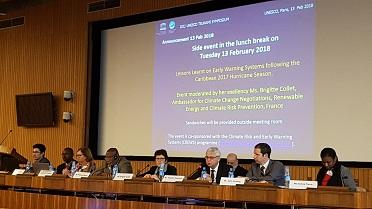
Panel members at the CREWS side event at the UNESCO Tsunami Symposium
By Brigitte Leoni
GENEVA, 22 February, 2018 - Climate change means that coastal communities in the Caribbean need to be self-sufficient for up to three weeks and not just a couple of days if they are to cope with the fall-out from hurricane activity at the level of intensity experienced during the 2017 Atlantic Hurricane Season, according to a weather expert.
“We have been very focused on putting communities at the center of our early warning system in the Caribbean but we need to continue empowering them as the climate is changing and events are more severe. We trained communities to be prepared and self-sufficient for two or three days when they need to be doing it for 3 to 4 weeks,” said Ms. Christa Von Hillebrandt-Andrade, head of the National Weather Service Caribbean Tsunami Warning Programme.
“When disasters happen, people have very high expectations from governments so we need to know what is happening in coastal communities, we need to know more about inundation modeling and have joint-training between hydro-met and other agencies to be less vulnerable” she added when she spoke at an event organized at last week’s 2nd International Tsunami Symposium.
“We had not had a hurricane like this since 90 years and we were absolutely not prepared for such an event,” she told a meeting on “Lessons Learnt in Early Warning Systems following the 2017 Hurricane Season in the Caribbean” organized by the Climate Risk and Early Warning Systems (CREWS) in Paris last Tuesday. Ms. von Hillebrandt-Andrade was shocked by the devastation caused to her native Puerto Rico by the Category 5 Hurricane Maria, packing winds of 280 km/h.
Hurricane Maria was one of the strongest hurricanes ever recorded in the Caribbean, causing more than 300 casualties and over US$90 billion in economic losses, making it the third costliest tropical cyclone on record and the costliest in Puerto Rican history.
The 2017 Atlantic hurricane season featured 17 named storms including ten consecutive hurricanes. Preliminary estimates put it as the costliest hurricane season on record with total economic losses in the region of US$280 billion.
As part of the CREWS initiative, the World Meteorological Organization (WMO) is currently leading a comprehensive review of the Early Warning Systems in the Caribbean following last year`s Hurricane season. It is the first time such a review is being conducted and the findings and recommendations will be made available before the start of this year’s Atlantic Hurricane Season in May.
Two regional institutions based in Barbados, the Caribbean Institute of Meteorology and Hydrology (CIMH) and the Caribbean Disaster Emergency Management Agency (CDEMA) will be leading the experts’ review, which will contribute to a harmonized vision on how the region will address issues of not just alert and warning but also how communities respond to this information. The issue of gender will also be given specific treatment within the review.